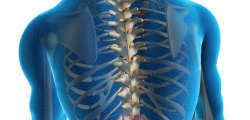Parkinson's disease (PD)
Parkinson's disease is caused by a lack of neuro-transmitter (dopamine) within part of your brain. This means that signals do not pass from one nerve cell to another. It can therefore be very difficult to start or stop movements. Symptoms vary from person to person and can include:
- Problems starting and stopping movements
- 'Freezing' when walking.
- Stooped posture.
- Gait problems.
- Balance problems.
- Tremors.
- Muscle spasms.
- Stiffness of muscles and joints.
- Impaired sensation.
- Difficulty getting in and out of bed, or moving from sitting to standing.
- Difficulty with handwriting.
- Difficulty dressing and undressing especially with buttons.
- Slowness of movement.
- Breathing problems.
- Speech problems.
Neurological Physiotherapy can help to:
- Reduce tightness in muscles and relieve associated pain.
- Mobilise stiff joints.
- Improve posture through re-education and muscle strengthening.
- Teach movement strategies for functional tasks.
- Balance re-training.
- Gait re-education.
- Improve breathing.
- Maintain independence and prevent deterioration.
It is useful to assess people diagnosed with Parkinson's disease as early as possible. This allows me to identify and treat any smaller problems that arise and prevent them developing into larger functional issues. Clients usually undergo a short course of treatment followed by completion of home exercise programme independently. This is then reviewed at 6-8 week intervals and relevant changes are made.
To contact us for an appointment or regarding any queries please call 07816 768456 or email info@dawnburrow-neurologicalphysiotherapyservice.co.uk



Services
What we treat
- Stroke (CVA)
- Spinal Cord Injury (SCI)
- Parkinson’s disease (PD)
- Multiple Sclerosis (MS)
- Traumatic Brain Injury (TBI)
- Vestibular Problems
- Balance Problems
- Bell’s Palsy
- Elderly rehabilitation and falls prevention
Areas we cover
We cover the following locations:Witney, Carterton, Bampton, Curbridge, Ducklington, North Leigh, South Leigh, Clanfield, Burford, Kidlington, Woodstock, Standlake, Long Hanborough, Bladon, Hailey, Leafield, Finstock, Stonesfield, Shipton under Wychwood, Eynsham, Cassington, Farmoor, Cumnor, Shilton, Minster Lovell, Charlbury, Freeland, OX28, OX29, OX18
Please contact us to find out if we cover your area.




